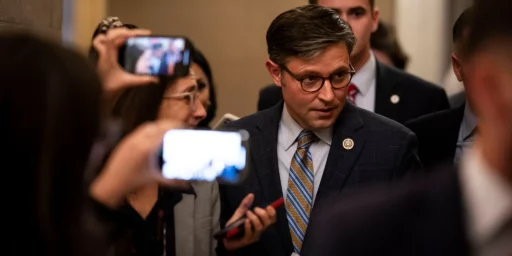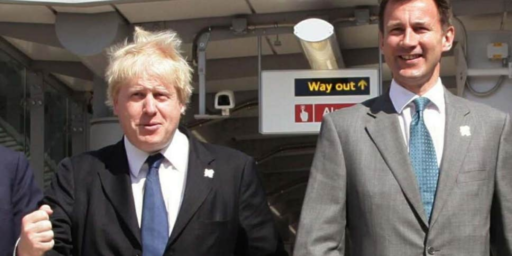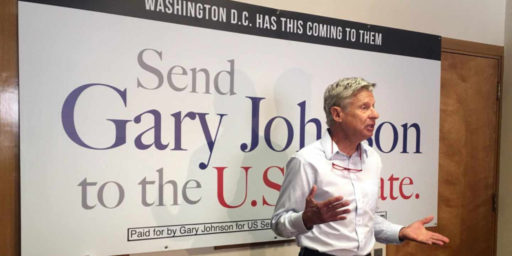Filling Senate Vacancies
Matthew Shugart and Steven Taylor have interesting posts on the subject, currently topical because of uncertainly surrounding the health of South Dakota’s Senator Tim Johnson, on the process for replacing vacancies in the Senate.
Both argue, persuasively, that the ability of governors to appoint replacements for the remainder of a given Congress is anachronistic. Shugart correctly notes that the “Republican party is a heartbeat and one act of partisan cronyism away from regaining what the voters stripped it of in November’s election: Control of the United States Senate.” Taylor asks, “why should a partisan official get to make the determination as to whom will serve in the Senate when the post is one that is meant to represent the electorate?”
Both suggest that special elections, as is required for the House of Representatives, are more democratic and I agree.
The rationale for treating Senators differently is that the Senate represents states, not voters. Even though the 17th Amendment provided for direct election, the Senate is still one of the main vestiges of Federalism that remain. Still, the culture has shifted dramatically in recent decades and people think of Senators as mere at-large congressmen.
Even if, for reasons of tradition or expense, we decided that temporary appointments were the way to go, the current mechanism is still a bad one. There’s something quite disturbing about a party switch–let alone a potential switch in control of the Senate–happening because of the death or incapacity of an elected official.
The simplest alternate would be a gentleman’s understanding that governors of whatever party would appoint an able member of the elected Senator’s party, presumably in consultation with party leaders in the state. Unfortunately, this would be unenforceable and political considerations too often trump honorable behavior.
A more complicated possibility would be to have the elected Senator appoint his prospective replacement ahead of time. Every Senator, upon election, would be asked to nominate a successor in the event he is removed from office. That person would almost surely be from the Senator’s party and reasonably similar in ideology, making it much more likely than under the current system that the replacement would resemble the elected Senator.
Indeed, there is no Constitutional reason I can think of where the replacement couldn’t be temporary, as provided for presidents under the 23rd Amendment. Under that system, Tim Johnson could worry about recovering, his constituents would still be represented in the Senate, and Johnson could resume office when he’s able. That strikes me as the best outcome for all concerned.






I take the point about representation, but rather look at Senators as representing voters, just not in the same way that Representatives do.
Your “alternate” suggestion is an interesting one.
Call me old. Call me a fuddy-duddy. Call me whatever you like.
I just don’t see a need to tweak every damn thing in the body politic to make it as perfect as an act of God.
The current system of appointed replacements–with its potential for not representing the will of the voters in a given election–has worked satisfactorily up til now. If all state governors belonged to one party and consistently shifted the power in Congress to one party or another, then maybe there’s a problem that needs addressing. For now, though, the system isn’t broken, it’s just not perfect.
As long as it was done with a constitutional amendment (given the current mechanism is in the constitution), I think your alternate proposal is a good one. I would make one tweak, requiring the person to designate their alternate when the file for election. Just as the VP can be a consideration for the presidential election, I think the alternate should also be part of the election consideration.
As a practical matter what this would do is encourage senators to “balance” themselves within their states. Obama would probably look for some southern Illinois person as his alternate. Hillary would look for an upstate New Yorker.
If you really want to make it interesting, let the alternate cast the vote when the primary is not present. That would likely put the senator into permanent re-election mode and the alternate acting more as a chief of staff to stay in the office and vote. Likely the alternate would be as significant a position for running for a retiring senators seat as the VP has become for a retiring president’s office.
I agree with John, and would also add that I recall absolutely none of this being brought up as a “problem” when Governor Barnes appointed Democrat Zell Miller to complete the term of deceased Republican senator Paul Coverdell.
I should also add that if a state chooses to, it may modify the way it selects a replacement Senator. I recall that the Massachusetts legislature took the power to appoint Kerry’s replacement (had he won the 2004 election) away from Mitt Romney and gave it to themselves. What is to say a state cannot modify its own laws to allow for a special election rather than have the Governor appoint the person? I am going to guess that, yes, for a large state like California, the cost of having a state-wide special election could be costly and perhaps they would prefer to just remain with the appointment process in place.
The way a Senator is replace is determined by the State and should remain so. The Federal Government has obtained way too much power in my opinion.
I have distaste for a Governors ability to change the balance of power and think it should be only until the state is able to hold Special election but have problems with the alternatives as well. Also it is the States call. Another issue is a member of Congress switching parties that can change balance of power.
A gentlemen’s understanding has proven to ineffective.
I have a big problem with a Senator appointing his replacement. This would open up a big loophole for corruption. Pay a Senator enough money and he will appoint you as a replacement and step down. Anybody remember what stink it was with the Governor of Alaska appointed his daughter as his replacement as Senator and that was legit in current system.
John B: I don’t disagree in the abstract. Still, it doesn’t seem right that one fellow in North Dakota might get to, in effect, decide who controls the Senate.
YAJ: I’m with John B on not tweaking too much. I don’t want to create proxy Senators, just alternates.
Mark: There was quite a bit of discussion at the time, actually. The difference then, though, was that control of the Senate wasn’t hanging in the balance.
Wayne: Hadn’t thought of the prospect of someone literally buying a Senate seat. It’s a good point.
Are you suggesting letting senators pick their replacements? Good Lord, don’t we have enough nepotism and cronyism without allowing Senators to annoint their successors, no matter how temporary The wishful thinking above that this encourage candidates to help balance their “ticket” is laughable. Oh, and are these the same senators that just picked Robert Byrd as the Senate President Pro Tempore? I have a feeling that’s what these choices will be like if something like this is implemented.
I wonder if Mr. Shugart and Mr. Taylor were as exercized when Senator Paul Coverdell was replaced by Zell Miller.
What a surprise! Change the rules, I don’t like the outcome!
Charles: I’m pretty sure Taylor was opposed to Coverdell being replaced by Miller; not sure about Shugart.
The Pro Tem position always, always, always goes to the senior Senator from the majority party. Strom Thurmond had the gig not long ago.
Edgardo: I’m perfectly happy for Republicans to retake the majority. Had George Allen, for whom I voted, been reelected, they would have kept it. Still, the voters of SD picked Democrat Johnson (narrowly) and the voters of the country booted the GOP out of power last month. It strikes me as wrong in both counts to change that result through executive fiat.
In MA in 2004 they changed the state law about a week before the election to take the replacement power away from Romney in case, praise the Lord it didn’t happen, Kerry got elected. I think that along with the Electoral College, filibuster rules and the like only depends on whose ox is being gored.
what if you kept the right for a governor to appoint, but only until the next general election. Then you could have an election to fill the seat for the balance of the term remaining.
djneylon: That’s what they do now.
like Jim Jeffords switching parties last time around, huh? death or illness is as much a part of the political system as the ability to simply change your mind and your party. none of it should happen, but it does.
g-man: Sure. But we can learn from the past and prevent the worst outrages. I would be happy to prevent Members from changing parties after an election without resigning and standing for re-election.
The rules for appointment or election of a Senator who leaves office are set by state law which differs from state to state.
Changing the rules will not happen for Johnson’s SD seat.
The search for “the perfect outcome” as a matter of political theory will never yield that result because of the myriad combinations and permutations which are possible at a given time.
This is an exercise worthy of comment, but without much practical effect IMHO.
Like Steven, in the first comment above, I accept the argument that the Senate is functionally different, but, still (as Steven said) it is (since the 17th Amendment) supposed to represent the voters in the states.
On the idea of alternates, James suggested:
Every Senator, upon election, would be asked to nominate a successor in the event he is removed from office.
An idea like this was floated by some scholars who wanted to ensure a means of congressional continuity in the event of a massive attack that killed more than a quorom’s worth of legislators. But the idea of “alternates” makes me cringe, given how I have seen it abused in Latin America. The idea I had in proposing that we ensure a speedy special election when there is a vacancy was to reduce cronyism. But allowing Senators to designate their replacements would be a boon to cronyism.
Further, James, you say: “the Senate is still one of the main vestiges of Federalism.” I disagree. Federalism requires separate state governments with sovereignty, a constitution to protect that sovereignty, and an independent judiciary to enforce the constitution. It logically implies (but does not require) a Senate to represent the states (or their voters) with at least some powers. But it does not require any specific model of Senate powers or representation schemes. The US is unusual, even for fully federal systems, among the advanced industrial democracies in terms of its rigid principles of co-equality of chambers and equal representation of states (regardless of size disparities).
As long as we’ve got state governments and a Supreme Court with judicial review, federalism is safe.
Anyway, we are basically in agreement here: Party control should not hinge on possible gubernatorial appointment.
Above,someone commented:
I wonder if Mr. Shugart and Mr. Taylor were as exercized when Senator Paul Coverdell was replaced by Zell Miller.
I resent the suggestion that this is a partisan opinion. For the record, I am not a Democrat, and I am reasonably certain Dr. Taylor is not either. But, really, that is irrelevant.
We are both political scientists concerned about democracy–with a small ‘d.’
So, yes, I have felt this way in all cases, regardless of the party of the Senators and Governors involved.
Oh, and someone raised the Jeffords party switch. I did not like the fact that one Senator could swing control between elections. However, such a situation is qualitatively different. An elected legislator is always free to vote his conscience and, yes, change who he or she caucuses with. But a Governor should not be free to change partisan control when a Senator happens to have died (or left office for any other reason).
Democrat Zell Miller
Seems the joke was on the Dems.
We elect people, not parties. That’s why we don’t have proportional represenation. The problem with party switching is that the switcher has broken his campaign promises, not that it’s unfair to the party.
MSS – I’m sorry you resented my question. Is there a problem asking if folks are consistent when you don’t know much about them?
I’m glad to hear you were against then as well as now.
I don’t think the Federal government should be involved with how a state chooses to replace incapacitated senators.
I personally don’t care for the idea of a senator nominating his/her replacement, makes me think there is too much room for back room wheeling and dealing, something we don’t need more of.
Is this an ideal situation? Nope, but then how often does something like this really happen, and does it require more medling from the federal government?
As for the will of the voters-there wasn’t a South Dakota senator running this time around-so the people of South Dakota didn’t even have a choice over senate control? Perhaps control of the senate going democrat isn’t what the South Dakota voter wanted in 2006.
So I guess I think this should be a state level decision, sometimes things will happen that we don’t like, but they don’t happen often enough to justify in my opinion further federal medling.
I do sort of think what makes sense at a state level, is for either the legislature to appoint the replacement or to require that the replacement be from the same party as the incapacitated democrat, but once again, I think the decision should be made at the state level, not the federal one, and if once in a blue moon these situations change the seat of power in the senate-then so be it.
I will say that I would like to see special elections held to replace senators-although I think waiting until the next election cycle would be the most cost effective way to do it.
I still don’t have any ideas who will take the senate seat.